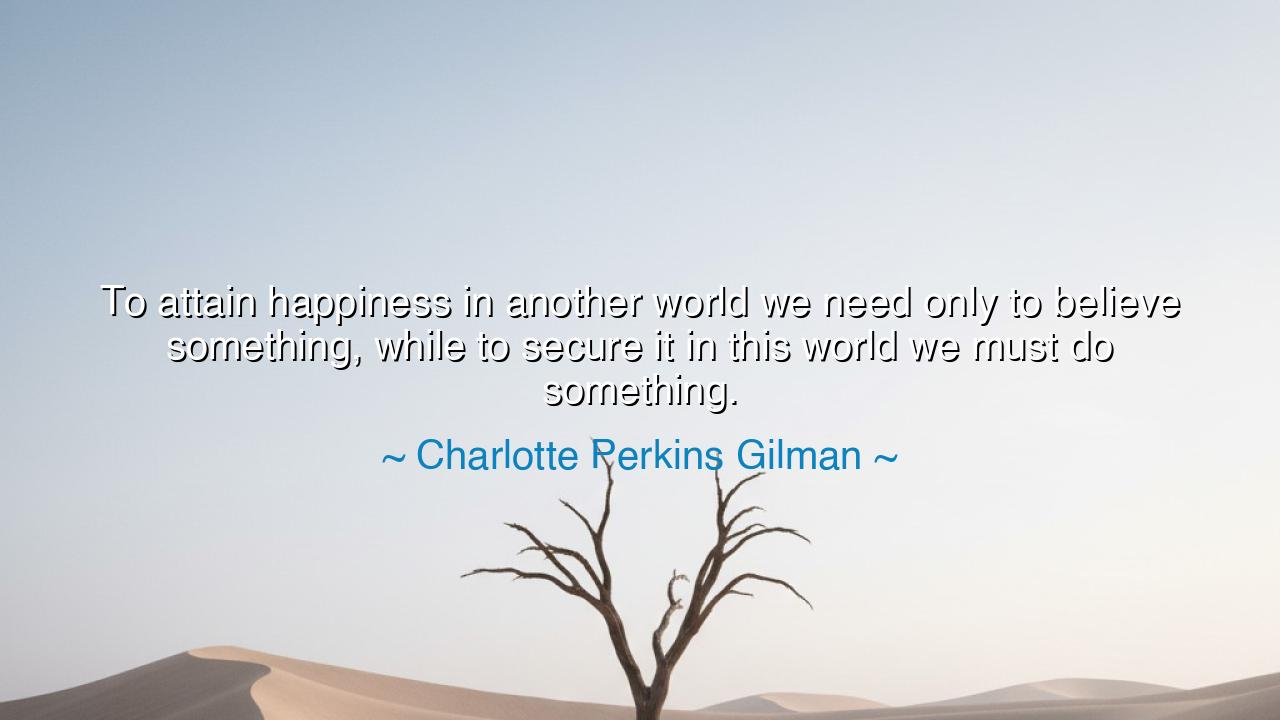
To attain happiness in another world we need only to believe
To attain happiness in another world we need only to believe something, while to secure it in this world we must do something.






“To attain happiness in another world we need only to believe something, while to secure it in this world we must do something.” Thus spoke Charlotte Perkins Gilman, the luminous voice of justice and awakening in the late nineteenth and early twentieth centuries. In these words, she delivers not a dismissal of faith, but a clarion call to action—a reminder that while belief may promise comfort in eternity, only deeds can heal and uplift the living world. For Gilman, who saw the pain of women bound by silence and the struggle of humanity chained by inaction, happiness was not a passive hope, but a living labor. She calls upon every soul not merely to dream of heaven, but to build one here upon the earth.
Gilman lived in an age when religion promised salvation in the afterlife, yet society offered misery to many in the present. As a writer, philosopher, and reformer, she saw the gap between faith and practice, between prayer and justice. Her most famous work, The Yellow Wallpaper, exposed how inaction—how submission to oppressive systems—destroys the human spirit. Thus, when she wrote this quote, she was not rejecting the power of belief, but reminding the world that belief without action is barren. It is easy to believe in happiness beyond the grave, she warns, but to create happiness in this life—to feed the hungry, to free the oppressed, to mend the broken heart—requires work, courage, and compassion.
Her words hold within them the wisdom of the ancients, who taught that the gods help those who help themselves. Faith, she says, is the seed—but action is the harvest. Heaven may reward belief, but earth demands labor. To wait for happiness to descend like a gift from above is to misunderstand the divine purpose of human life. For man and woman alike were not born merely to hope—they were born to create, to shape, and to serve. The world itself, with all its sorrow and glory, is the workshop of the soul. Here, each act of kindness, each brave decision, each patient effort, builds the invisible architecture of earthly joy.
Consider the life of Florence Nightingale, who could have sought comfort in faith alone, but instead chose to act. She believed in mercy, yet she did not pray for it from afar—she brought it into the world through her hands. Amid the filth and agony of war, she labored by candlelight, healing the wounded and reforming the broken systems of care. Her faith guided her, but it was her action that transformed the world. Through her, we see the truth of Gilman’s words: that to secure happiness in this world, one must do something. The good we long for is not delivered to us—it is made by us.
And yet, Gilman’s teaching carries more than activism—it carries responsibility. She challenges the complacent heart that hides behind belief to excuse its silence. How many say, “All will be well in another world,” while ignoring the cries of this one? How many hope for heaven while turning away from suffering on earth? Such faith, she warns, is no faith at all, but evasion. True faith shines not in words but in works, not in the promise of tomorrow but in the service of today. For heaven, if it exists, is not a distant kingdom—it is the world made right through the hands of the just.
Her wisdom also speaks to the loneliness of the human condition. To act is to risk, to strive, to fail, and to rise again. But through action, we become part of something greater than ourselves. Belief is solitary; action unites. The farmer, the teacher, the healer, the builder—all find meaning not in wishing, but in doing. In each task completed with love, happiness begins to take root. The one who acts for others finds that joy no longer needs to be sought—it comes quietly, like dawn after darkness. For in the work of the heart, belief finds its truest fulfillment.
Let this be the lesson passed down to those who would live wisely: Do not wait for happiness—create it. Believe, yes, but let your belief move your hands and guide your steps. Feed the hungry, comfort the lonely, heal the sick, speak for the silenced, plant beauty where there is none. In doing, you will find more joy than all the promises of heaven could bestow. For as Charlotte Perkins Gilman teaches us, to believe may prepare the soul for eternity—but to act is to sanctify the present moment. And in that sacred labor, where belief becomes deed and hope becomes creation, mankind comes nearest to divine happiness—the happiness that lives not in dreams, but in the living heart of the world.






AAdministratorAdministrator
Welcome, honored guests. Please leave a comment, we will respond soon